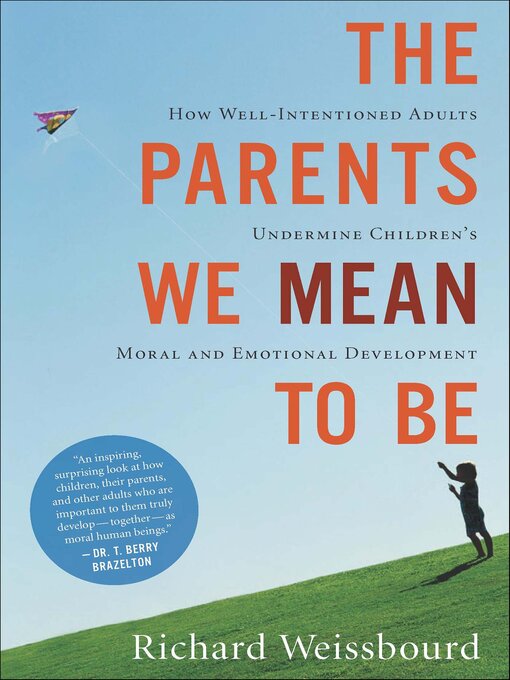The Parents We Mean to Be
How Well-Intentioned Adults Undermine Children's Moral and Emotional Development
Harvard psychologist Richard Weissbourd argues incisively that parents—not peers, not television—are the primary shapers of their children's moral lives. And yet, it is parents' lack of self-awareness and confused priorities that are dangerously undermining children's development.
Through the author's own original field research, including hundreds of rich, revealing conversations with children, parents, teachers, and coaches, a surprising picture emerges. Parents' intense focus on their children's happiness is turning many children into self-involved, fragile conformists.
The suddenly widespread desire of parents to be closer to their children—a heartening trend in many ways—often undercuts kids' morality. Our fixation with being great parents—and our need for our children to reflect that greatness—can actually make them feel ashamed for failing to measure up. Finally, parents' interactions with coaches and teachers—and coaches' and teachers' interactions with children—are critical arenas for nurturing, or eroding, children's moral lives.
Weissbourd's ultimately compassionate message—based on compelling new research—is that the intense, crisis-filled, and profoundly joyous process of raising a child can be a powerful force for our own moral development.
-
Creators
-
Publisher
-
Release date
May 21, 2024 -
Formats
-
OverDrive Read
- ISBN: 9780547525327
-
EPUB ebook
- ISBN: 9780547525327
- File size: 1138 KB
-
-
Languages
- English
-
Reviews
-
Publisher's Weekly
January 19, 2009
Harvard psychologist Weissbourd (The Vulnerable Child
) delivers a direct, digestible wakeup call about the need for better moral instruction for children. Enlisting a battery of researchers to conduct interviews with students, teachers and parents mostly in the Boston area and the South, Weissbourd asserts quite forcefully and repetitively that by abdicating moral authority to popular culture and children's peers, by shielding children from their destructive behavior, by letting fathers “off the hook” and by insisting on children's happiness rather than their goodness, adults are failing their own children. Weissbourd looks at the role of shame in engendering children's destructive acts, and how it can result from parents' excessive expectations and fears of their children's emotions. Promoting an elusive notion of happiness sacrifices important lessons in empathy, appreciation and caring, while parents' self-interest continually “erodes the basis for community.” The author advocates checking parents' overweening drive for achievement in our children, refraining from wanting to be their best friend and cultivating a healthy idealism. He cites a woeful lack of self-awareness by parents and the need for building alliances with teachers and other parents. His chapter on the “morally mature sports parent” is a sober reminder of why we want our children to play sports. Moral strengths and failures among different cultures are particularly explored in this strongly worded work that barely grazes the tip of the iceberg.
-
Formats
- OverDrive Read
- EPUB ebook
subjects
Languages
- English
Loading
Why is availability limited?
×Availability can change throughout the month based on the library's budget. You can still place a hold on the title, and your hold will be automatically filled as soon as the title is available again.
The Kindle Book format for this title is not supported on:
×Read-along ebook
×The OverDrive Read format of this ebook has professional narration that plays while you read in your browser. Learn more here.

